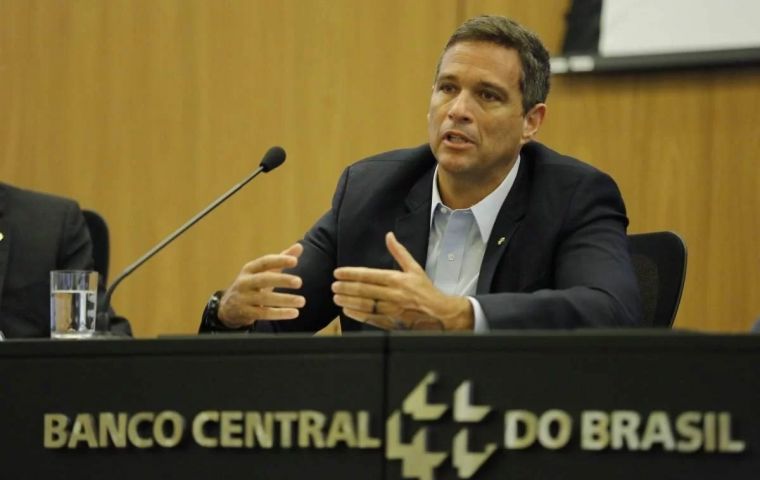MercoPress. South Atlantic News Agency
BCB head says worst part of inflation in Brazil is over
 “In the end, it is the markets that produce food and energy,” Campos Neto insisted
“In the end, it is the markets that produce food and energy,” Campos Neto insisted Brazil's Central Bank (BCB) CEO Roberto Campos Neto said Monday that the worst part of inflation in his country was over, after the proper tools to curb the process had been taken.
“The worst moment of inflation is over,” Campos Neto told attendees at a panel on Erosion of the International Public Order and the Future included in the Tenth Lisbon Legal Forum, in the Portuguese capital.
In his speech, Neto recalled that Brazil “is one of the few countries that in the middle of this process is having upward revisions” of the Gross Domestic Product (GDP). He added that thanks to Brazil's history of high inflationary rates in Brazil, the local monetary authority had managed to “come out ahead.”
“Even our last revision in the Central Bank increased [the GDP growth forecast] from 1.5% to 1.7% [in 2022]. We will probably have strong GDP in the second quarter. Obviously, at some point, everything we are doing will generate some deceleration in the second half. But still, growth is much better than what was expected at the beginning of the cycle,” said Campos Neto.
“Since we in Brazil understood that it was more of a demand problem, in my opinion, even a little earlier than the other countries, the Brazilian Central Bank came out ahead because we have a much longer memory of inflation, and indexing mechanisms that are much more alive,” he said.
Campos Neto also pointed out that all countries were raising their interest rates and that, while some countries were in the middle of the road, Brazil was already very close to having done all the work. “We are still going to see some countries raising interest rates a lot,” he insisted.
Brazil still presents a “component of acceleration in inflation; we have some measures designed by the government that we still need to understand their effects on the inflationary process, which is still not clear, but Brazil did the anticipating process and we believe that our tool is capable and will curb the inflationary process,” Campos Neto went on.
He also said he believed that the inflationary indexes that are being registered in several countries stem from a “disconnection between prices and investments” that goes beyond oil and also includes food.
“Governments are facing the dilemma of guaranteeing energy and food security for the population,” he said. In this sense, “many countries, due to the war, are adopting protectionist measures that are contaminating the rest of the inflation chain” and while governments long to generate food and energy security, it is all being done in an uncoordinated way, thus “generating a fall in investment,” the Brazilian official also explained.
In his view, the lack of coordination is generating a drop in investments in both energy and food. “We need to understand that those who produce food and energy are not the government, but the private sector, and that the government has to address the problem of the lower social classes, but cannot deviate from market practices, because, in the end, it is the markets that produce food and energy,” he added.
(Source: Agencia Brasil)




Top Comments
Disclaimer & comment rulesCommenting for this story is now closed.
If you have a Facebook account, become a fan and comment on our Facebook Page!